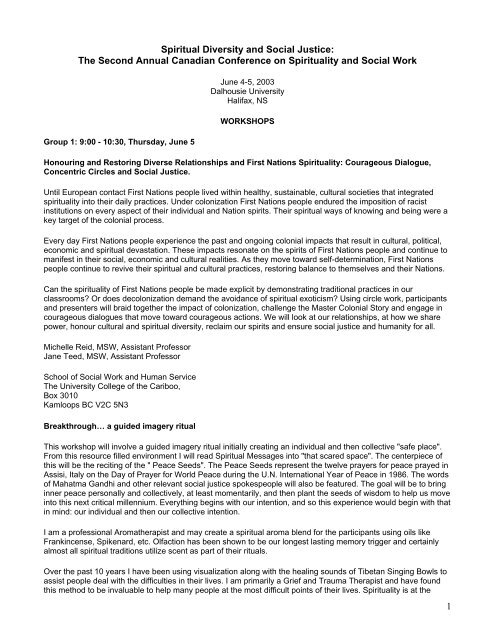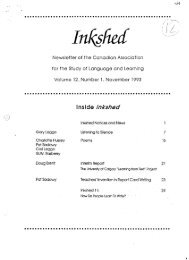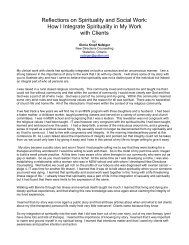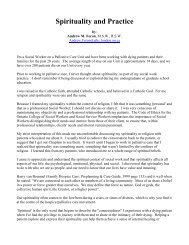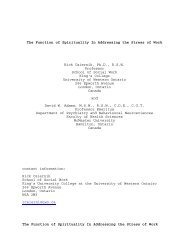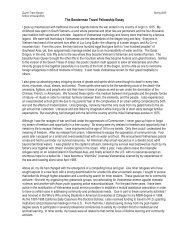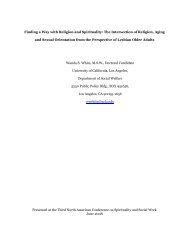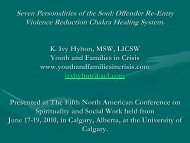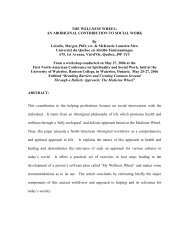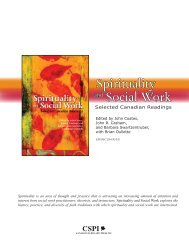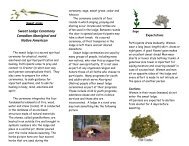Spiritual Diversity and Social Justice: - St. Thomas University
Spiritual Diversity and Social Justice: - St. Thomas University
Spiritual Diversity and Social Justice: - St. Thomas University
You also want an ePaper? Increase the reach of your titles
YUMPU automatically turns print PDFs into web optimized ePapers that Google loves.
<strong>Spiritual</strong> <strong>Diversity</strong> <strong>and</strong> <strong>Social</strong> <strong>Justice</strong>:<br />
The Second Annual Canadian Conference on <strong>Spiritual</strong>ity <strong>and</strong> <strong>Social</strong> Work<br />
Group 1: 9:00 - 10:30, Thursday, June 5<br />
June 4-5, 2003<br />
Dalhousie <strong>University</strong><br />
Halifax, NS<br />
WORKSHOPS<br />
Honouring <strong>and</strong> Restoring Diverse Relationships <strong>and</strong> First Nations <strong>Spiritual</strong>ity: Courageous Dialogue,<br />
Concentric Circles <strong>and</strong> <strong>Social</strong> <strong>Justice</strong>.<br />
Until European contact First Nations people lived within healthy, sustainable, cultural societies that integrated<br />
spirituality into their daily practices. Under colonization First Nations people endured the imposition of racist<br />
institutions on every aspect of their individual <strong>and</strong> Nation spirits. Their spiritual ways of knowing <strong>and</strong> being were a<br />
key target of the colonial process.<br />
Every day First Nations people experience the past <strong>and</strong> ongoing colonial impacts that result in cultural, political,<br />
economic <strong>and</strong> spiritual devastation. These impacts resonate on the spirits of First Nations people <strong>and</strong> continue to<br />
manifest in their social, economic <strong>and</strong> cultural realities. As they move toward self-determination, First Nations<br />
people continue to revive their spiritual <strong>and</strong> cultural practices, restoring balance to themselves <strong>and</strong> their Nations.<br />
Can the spirituality of First Nations people be made explicit by demonstrating traditional practices in our<br />
classrooms? Or does decolonization dem<strong>and</strong> the avoidance of spiritual exoticism? Using circle work, participants<br />
<strong>and</strong> presenters will braid together the impact of colonization, challenge the Master Colonial <strong>St</strong>ory <strong>and</strong> engage in<br />
courageous dialogues that move toward courageous actions. We will look at our relationships, at how we share<br />
power, honour cultural <strong>and</strong> spiritual diversity, reclaim our spirits <strong>and</strong> ensure social justice <strong>and</strong> humanity for all.<br />
Michelle Reid, MSW, Assistant Professor<br />
Jane Teed, MSW, Assistant Professor<br />
School of <strong>Social</strong> Work <strong>and</strong> Human Service<br />
The <strong>University</strong> College of the Cariboo,<br />
Box 3010<br />
Kamloops BC V2C 5N3<br />
Breakthrough… a guided imagery ritual<br />
This workshop will involve a guided imagery ritual initially creating an individual <strong>and</strong> then collective "safe place".<br />
From this resource filled environment I will read <strong>Spiritual</strong> Messages into "that scared space". The centerpiece of<br />
this will be the reciting of the " Peace Seeds". The Peace Seeds represent the twelve prayers for peace prayed in<br />
Assisi, Italy on the Day of Prayer for World Peace during the U.N. International Year of Peace in 1986. The words<br />
of Mahatma G<strong>and</strong>hi <strong>and</strong> other relevant social justice spokespeople will also be featured. The goal will be to bring<br />
inner peace personally <strong>and</strong> collectively, at least momentarily, <strong>and</strong> then plant the seeds of wisdom to help us move<br />
into this next critical millennium. Everything begins with our intention, <strong>and</strong> so this experience would begin with that<br />
in mind: our individual <strong>and</strong> then our collective intention.<br />
I am a professional Aromatherapist <strong>and</strong> may create a spiritual aroma blend for the participants using oils like<br />
Frankincense, Spikenard, etc. Olfaction has been shown to be our longest lasting memory trigger <strong>and</strong> certainly<br />
almost all spiritual traditions utilize scent as part of their rituals.<br />
Over the past 10 years I have been using visualization along with the healing sounds of Tibetan Singing Bowls to<br />
assist people deal with the difficulties in their lives. I am primarily a Grief <strong>and</strong> Trauma Therapist <strong>and</strong> have found<br />
this method to be invaluable to help many people at the most difficult points of their lives. <strong>Spiritual</strong>ity is at the<br />
1
heart of who I am as an individual, as well as being the guiding force in how I approach my work. Many people<br />
report to me a heightened sense of their spirituality <strong>and</strong>/or a deep sense of Peace after a visualization session.<br />
Ken Osbourne,<br />
<strong>Social</strong> Worker<br />
Psychotherapy professional<br />
Professional Aromatherapist<br />
Private practice with Breakthrough<br />
www.breakthrough.ns.ca.<br />
<strong>Spiritual</strong>ity in Clinical Practice<br />
This workshop is representative of some of the work done by the Editors <strong>and</strong> two contributors of the recently<br />
published book <strong>Spiritual</strong>ity <strong>and</strong> <strong>Social</strong> Care: Contributing to Personal <strong>and</strong> Community Well-being. Each presenter<br />
will speak to the issue of how spirituality is incorporated into his or her clinical or education practice. The<br />
workshop begins with an introduction to a traditional Aboriginal ceremony commonly referred to as Smudge or<br />
Cleansing Ceremony. The introduction includes the meaning of the various medicines that are used in this<br />
ceremony along with the meaning of the ceremony itself. After this each individual presenter, in the spirit of<br />
partnership with the others, speaks about the spiritual activities <strong>and</strong>/or symbols they use in their clinical or<br />
educational environment.<br />
Mr. <strong>St</strong>ewart presents on the role of spirituality in his work at an outpatient psychiatric health clinic. Dr. Wheeler<br />
speaks to the use of spirituality in relation to addictions <strong>and</strong> health as it is delivered in isolated sub-Arctic<br />
communities. Mr. Beatch speaks to the use of spirituality in his diverse clinical practice <strong>and</strong> Dr. Nash models an<br />
aspect of her approach to teaching spirituality to university social work students of indigenous, European <strong>and</strong><br />
other ethnic backgrounds in New Zeal<strong>and</strong>.<br />
Bruce <strong>St</strong>ewart, MSW, M. Phil,<br />
Clinical <strong>Social</strong> Worker<br />
Dr. Ross Wheeler,<br />
Addiction Specialist<br />
Romeo Beatch, MC.,<br />
Psychologist<br />
Dr. Mary Nash, Senior Lecturer,<br />
Massey <strong>University</strong>, New Zeal<strong>and</strong><br />
Music <strong>and</strong> <strong>Social</strong> Work<br />
Paula Foley will present on the role of music <strong>and</strong> the voicing of our own personal sound as a sacred <strong>and</strong> radical<br />
act of empowerment, personal possession <strong>and</strong> spirit on the soul’s journey toward deeper intimacy with itself <strong>and</strong><br />
other.<br />
Paula Foley, BSW, RSW<br />
Paula is a musician <strong>and</strong> has worked as a clinical social worker in the area of palliative care for the past 16 years.<br />
2
Life Balance with Yoga: I Honour the Light Within You<br />
The most important relationship you will ever have is the relationship with your Self - your Soul. In this seminar we<br />
will explore that relationship. We will begin with a brief guided meditation, focussing on the witness<br />
consciousness. Then, using the witness, we will explore our being at all levels.<br />
At the physical level seeing <strong>and</strong> experiencing the body as a temple. At the mental level clarifying your vision <strong>and</strong><br />
using your attitude <strong>and</strong> your thoughts as tools to manifest it. At the emotional level you will learn the three part<br />
yogic breath <strong>and</strong> how to use it to influence <strong>and</strong> integrate your emotions <strong>and</strong> gain greater awareness. At the<br />
spiritual level we will look at how to nourish the Soul through prayer, meditation, nature, music, mantra, serving<br />
<strong>and</strong> sharing. Finally, we will close with a deep guided meditation.<br />
Lone Ericson-Parker BSW, RSW<br />
Lone, a social worker, is a self-development consultant, a counsellor <strong>and</strong> a yoga-teacher/therapist in Fredericton,<br />
NB.<br />
Bridging the Secular <strong>and</strong> the Sacred: Exercises in Experiencing ‘now’<br />
“It is not through our beliefs that we bring spirituality to our life. It is ‘found’ in the present moment of nowness”<br />
This workshop will use a combination of formal meditation <strong>and</strong> post-meditation practices to explore what<br />
mindfulness/awareness can bring to our everyday life. There will be a session meditation practice followed by an<br />
exploration of nowness through some simple exercises using clay <strong>and</strong> paint.<br />
Craig Schneider<br />
Craig is a practicing artist/counsellor/Shambhala Buddhist meditation instructor, who is in private practice in<br />
Fredericton.<br />
Group 2: 10:45 - 12:15, Thursday, June 5<br />
TOWARDS SOCIAL JUSTICE:<br />
WALKING SPIRITUAL PATHS WITH PRACTICAL FEET<br />
This presentation will reflect on ways of solving problems, resolving conflicts <strong>and</strong> healing hurts through an open,<br />
inclusive <strong>and</strong> collaborative communication method based on principles of oneness, uniqueness, equality <strong>and</strong> gift<br />
giving, <strong>and</strong> aiming at reaching consensus with the objective of establishing social justice <strong>and</strong> creating unity in<br />
diversity.<br />
The presentation will elucidate each of the preceding concepts, i.e., social justice, openness, inclusiveness,<br />
collaboration, oneness, uniqueness, equality, gift giving <strong>and</strong> consensus, <strong>and</strong> will compare this method, founded<br />
on spiritual principles <strong>and</strong> termed “consultation” or, “concertation” -as the French people say-, with the conflict<br />
resolution method of “negotiation” based on mercantile world views.<br />
It will argue that the method of “concertation”, albeit seemingly taking more time to reach the cherished goal of<br />
social justice, is a safer, more effective <strong>and</strong> certain way of establishing sustainable social justice than the more<br />
competitive <strong>and</strong> compromising negotiation approach. It will also demonstrate its feasibility in social work clinical<br />
<strong>and</strong> community practices, particularly in multicultural milieu.<br />
It will conclude by visually demonstrating its connection to the ancient Asiatic, as well as American Native,<br />
concept of “m<strong>and</strong>ala” which represents unity in diversity.<br />
Margot Loiselle-Léonard, MSW<br />
Doctoral C<strong>and</strong>idate, Joint PhD Program<br />
Université de Montreal/McGill <strong>University</strong><br />
3
Walking the Talk-Embracing one’s own spirituality in the workplace<br />
An acknowledgement of the relationship between their own spiritual beliefs <strong>and</strong> ethical behaviour towards peers<br />
<strong>and</strong> clients could assist social workers to better h<strong>and</strong>le cultural diversity <strong>and</strong> social justice issues within the work<br />
place. <strong>Spiritual</strong>ity is a higher state of consciousness that enables individuals to be more compassionate,<br />
empathetic, caring <strong>and</strong> connected with the diversity of others. It is part of a person’s intelligence, associated with<br />
his/her heart. More ever, ethics is a set of moral principles or values. Currently, there is a renaissance of interest<br />
in paths of the heart <strong>and</strong> spirit <strong>and</strong> this resurgence of spirituality crosses racial, ethnic, political, cultural <strong>and</strong> class<br />
lines. Although moral philosophers agree there is no ethical cook book that provides easy answers to complicated<br />
dilemmas, they tend to agree that a fully informed spiritual/ethical consciousness always contains themes of<br />
caring. Becoming more spiritually attuned means viewing social justice <strong>and</strong> counselling through a fresh lens, by<br />
breaking through legalistic armour with more empathetic, caring models of practising social work. In my workshop,<br />
I will attempt to demonstrate the relationship between one’s spirituality <strong>and</strong> ethical behaviour, in the context of<br />
how social workers can walk their talk <strong>and</strong> talk their walk.<br />
Nancy Doetzel, BA, HBSW, HBA, MA, PhD C<strong>and</strong>idate<br />
<strong>University</strong> of Calgary<br />
Group 3: 1:15 - 2:45, Thursday, June 5<br />
The Gifts of <strong>Justice</strong> <strong>and</strong> Transformation From The Spirit World:<br />
Healing From Child Sexual Abuse<br />
This is the story of a woman who showed the world a strong exterior – a woman who appeared to have it<br />
together; after all, she was a social worker. It was illusion. In her hidden moments she railed against sensations of<br />
overwhelming anxiety, wept for her broken spirit <strong>and</strong> begged the unseen helpers for relief. This is the story of me.<br />
This workshop will open with a sage ceremony. I will share my story of spiritual intervention which released me<br />
from the anguish of sexual abuse. The participants will share experiences of mysterious intervention that helped<br />
them grow <strong>and</strong> develop as human beings. We will explore how this information can inform our practice as social<br />
workers.<br />
Joan S<strong>and</strong>erson, Associate Professor<br />
Saskatchewan Indian Federated College<br />
Saskatoon Campus<br />
Saskatoon, SK<br />
S7K 0P8<br />
Group 4: 3:00-4:30, Thursday, June 5<br />
Buddhist Practices That Increase Our Effectiveness as Helpers, Colleagues, <strong>and</strong> Advocates for <strong>Social</strong><br />
<strong>Justice</strong><br />
Presented from a Zen Buddhist perspective, this workshop offers participants instruction <strong>and</strong> an opportunity to try<br />
out some key Buddhist practices that can increase one's groundedness, openness, compassion <strong>and</strong> resilience as<br />
we work to increase social justice at a number of levels. Practices will include meditation (zazen), mindfulness,<br />
metta (loving-kindness), <strong>and</strong> equanimity. The relevance of these practices <strong>and</strong> the dilemmas that we face as<br />
social workers will also be presented.<br />
The presenter has degrees in both comparative religion <strong>and</strong> social work, <strong>and</strong> has been practising Zen Buddhism<br />
since the 1970's.<br />
Schoel Shuster, MA, MSW, RSW<br />
<strong>Social</strong> Worker<br />
Department of Family <strong>and</strong> Community Medicine<br />
<strong>St</strong>. Michael's Hospital, Toronto<br />
4
Healing the Bruised Heart- The Effects of Bullying on our Spirit<br />
Bullying is a common phenomenon, usually associated with young people attending school. Its various forms<br />
include physical, verbal, emotional, <strong>and</strong> provocative bullying. Its effects are far-reaching <strong>and</strong> can have a longlasting<br />
impact that continues well into our adult years. Bullying takes into account several social issues including<br />
dating violence, domestic abuse, eating disorders, <strong>and</strong> even suicide.<br />
It is the purpose of this 90 minute workshop to provide specific, useful strategies to deal with the issue of Bullying,<br />
whether one is a victim, a bully or a byst<strong>and</strong>er. This workshop will discuss the effects to our physical, emotional,<br />
<strong>and</strong> spiritual selves, <strong>and</strong> offer suggestions on how to re-claim these areas of our lives using anti-oppressive,<br />
multidisciplinary approaches that focus on healing the bruised hearts created by Bullying. Examples include<br />
relaxation, stress relievers, the creation of safe areas, restitution, <strong>and</strong> societal changes to our perception of the<br />
issue.<br />
Vicki Coy, BSW, RSW<br />
Executive Assistant, NBASW<br />
Fredericton, NB<br />
<strong>and</strong> Creator/Presenter “Bullying First Aid”<br />
5


